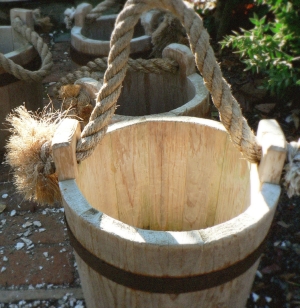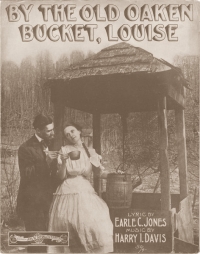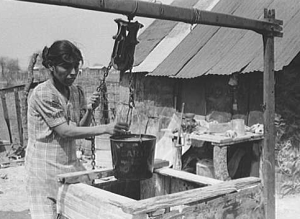-
History of:
- Resources about:
- More:
- Baby walkers
- Bakehouses
- Bed warmers
- Beer, ale mullers
- Besoms, broom-making
- Box, cabinet, and press beds
- Butter crocks, coolers
- Candle snuffers, tallow
- Clothes horses, airers
- Cooking on a peat fire
- Drying grounds
- Enamel cookware
- Fireplaces
- Irons for frills & ruffles
- Knitting sheaths, belts
- Laundry starch
- Log cabin beds
- Lye and chamber-lye
- Mangles
- Marseilles quilts
- Medieval beds
- Rag rugs
- Rushlights, dips & nips
- Straw mattresses
- Sugar cutters - nips & tongs
- Tablecloths
- Tinderboxes
- Washing bats and beetles
- Washing dollies
- List of all articles
Subscribe to RSS feed or get email updates.
By the old oaken bucket, Louise,
While the moon shed its light thro' the trees,
There I drank from your eyes,
'Neath the soft summer skies....
Lyrics by Earle C. Jones, c1908
September 1605, a cooper nine and a half days making a brewing-tub and mending old barrels (at 4d. a day) 3s. 2d. [3 shillings and twopence]; February 1609, a cooper for three hoops and making a cover for a tub to put salt in, and setting on two mops upon a pole 8d.....April 1619, a cooper five days' work 2s. 6d., and paid him for a great milking-collock [pail] 16d.; ....It would seem that after the daily wage of the cooper, with victuals, &c., had long stood at 4d., it was raised in 1619-20 to 6d.
Remains, Historical and Literary, Connected with the Palatine Counties of Lancaster and Chester, published by the Chetham Society, 1857
Water from the well
Buckets, coopering, and wood
 If
you had to fetch water from a well every day,
plastic buckets would probably seem practical and convenient. Yet
some of us who live in homes with piped water seem to have a nostalgic liking for
old-fashioned metal buckets, now considered decorative as well as useful.
If
you had to fetch water from a well every day,
plastic buckets would probably seem practical and convenient. Yet
some of us who live in homes with piped water seem to have a nostalgic liking for
old-fashioned metal buckets, now considered decorative as well as useful.
A hundred years ago nostalgia was for old wooden buckets. Craftsman-made tubs and pails were disappearing as cheap, factory-produced galvanised containers replaced them.
The old oaken bucket and the familiar washtub have been almost displaced by the galvanized steel articles that are much cheaper though not nearly so serviceable or lasting.
New York Times - July 25, 1915
 In
the US the "old oaken bucket" holds sentimental echoes of home, sweet home, expressed
in an 1817 poem
by Samuel
Woodworth, which was set to music, a
painting from the 1860s by Jerome Thompson, and at least one other
"old oaken bucket" song too.
In
the US the "old oaken bucket" holds sentimental echoes of home, sweet home, expressed
in an 1817 poem
by Samuel
Woodworth, which was set to music, a
painting from the 1860s by Jerome Thompson, and at least one other
"old oaken bucket" song too.
Across the Atlantic in England the passing of wooden well-buckets was also mourned:
...now the pail is of clanking galvanised iron; the old wooden pail, of oak staves with iron hoops, is nearly dead.
Gertrude Jekyll writing about cottage wells in Old West Surrey, 1904
The craftsmen who fitted staves of wood inside metal bands were called coopers. At the top of the tree were the "wet coopers", whose barrels and buckets were so well-made they were leak-proof.
If you want to see how coopers made buckets, there's an instruction video here, or look at this sequence of pictures. Some coopers call themselves "white coopers", a name that may refer to their use of pale woods. White coopers tended to concentrate on coopering for domestic and dairy containers.
 The wet coopers (also called tight coopers) formed an important trade association
in Victorian England, where good-quality barrels were still in great demand. Dry
coopers (also called slack coopers), made non-watertight barrels and other containers
to hold dry goods. Since their work was more easily replaced by machinery, their
trade faded out before the wet coopers'.
The wet coopers (also called tight coopers) formed an important trade association
in Victorian England, where good-quality barrels were still in great demand. Dry
coopers (also called slack coopers), made non-watertight barrels and other containers
to hold dry goods. Since their work was more easily replaced by machinery, their
trade faded out before the wet coopers'.
A piggin was a bucket with one extra-long stave used as the handle. The name and design lasted well in Newfoundland where they were used for bailing water out of boats.
 7 February 2008
7 February 2008
You may like our new sister site Home Things Past where you'll find articles about antiques, vintage kitchen stuff, crafts, and other things to do with home life in the past. There's space for comments and discussion too. Please do take a look and add your thoughts. (Comments don't appear instantly.)
For sources please refer to the books page, and/or the excerpts quoted on the pages of this website, and note that many links lead to museum sites. Feel free to ask if you're looking for a specific reference - feedback is always welcome anyway. Unfortunately, it's not possible to help you with queries about prices or valuation.


